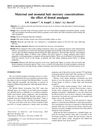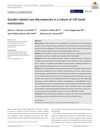February 2022 in “Fibers” Scientists created a non-toxic, sugar-based hair product that can style hair without damage.
 March 2003 in “BJOG: An International Journal of Obstetrics and Gynaecology”
March 2003 in “BJOG: An International Journal of Obstetrics and Gynaecology” Mothers and newborns with dental fillings have higher mercury in their hair, but adding fillings during pregnancy doesn't raise mercury levels further.
 January 2022 in “Sustainable development goals series”
January 2022 in “Sustainable development goals series” The document concludes that significant investment in agricultural innovation is necessary to achieve global food security and nutrition.
Some plants may help with hair growth but need more scientific evidence.
Minoxidil and a solvent mixture can prevent hair loss caused by chemotherapy in mice.

The document is retracted and cannot be summarized.
 1 citations,
November 2022 in “Hair transplant forum international”
1 citations,
November 2022 in “Hair transplant forum international” Rebuilding eyebrows is possible for people who have lost scalp hair in the Amazon.
 3 citations,
April 2019 in “Journal of Cosmetic Dermatology”
3 citations,
April 2019 in “Journal of Cosmetic Dermatology” Women's facial moisturizers cost more per ounce than men's.
 3 citations,
December 2018 in “PubMed”
3 citations,
December 2018 in “PubMed” Most over-the-counter hair loss treatments lack strong evidence of effectiveness and are not FDA-approved.
February 2015 in “Global journal of dermatology & venereology” 
The document's conclusion cannot be provided because the content is not accessible.
November 2014 in “Surgical research updates” Platelet Rich Plasma (PRP) may improve hair transplant success by increasing blood vessel and hair follicle growth.
 16 citations,
October 2015 in “Photochemistry and photobiology”
16 citations,
October 2015 in “Photochemistry and photobiology” Reducing copper (II) ion levels in hair can decrease hair damage.
 44 citations,
March 2020 in “Journal of the European Academy of Dermatology and Venereology”
44 citations,
March 2020 in “Journal of the European Academy of Dermatology and Venereology” The pandemic has pushed dermatology education and care to adopt digital solutions, which are effective and likely to continue post-pandemic.
11 citations,
December 2020 in “Advanced structured materials” Natural products like coconut oil and aloe vera are beneficial in cosmetics for their healing properties.
 1 citations,
April 2020 in “medRxiv (Cold Spring Harbor Laboratory)”
1 citations,
April 2020 in “medRxiv (Cold Spring Harbor Laboratory)” The study found that Tourette Syndrome may be linked to certain immune system processes and synaptic signaling.









